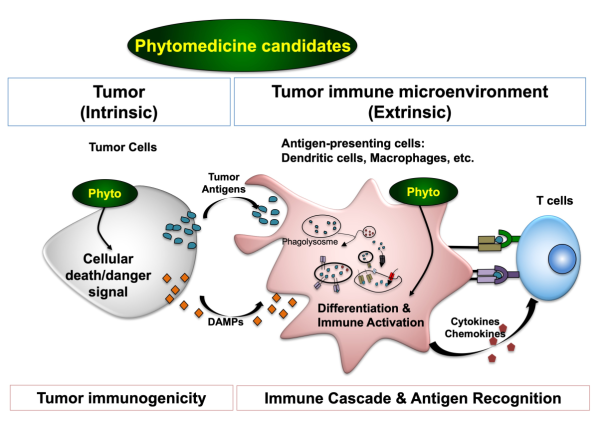Research Focus
Research Background
The importance of the integration of phytomedicines into modern medical practice for patients.
Emerging science and translational researches are being actively explored worldwide to develop novel phyto-therapeutic drugs for metabolic disorders, cardiovascular diseases, inflammation, neurological disorders, especiallyimmune disorders. Pharmacologically active ingredients in herbal medicines have long been regarded as a rich source of therapeutic leads in drug discovery on the basis of the anecdotal and historic practical experiences. The conventional “single molecule-based modern pharmaceutics” strategy has been challenged for treating chronic immune disordersinvolved in multiple pathogenic mechanisms, leading the new insights and opportunities for development of immunopharmacognostic interventions, with single or multiple defined ingredients.
Accumulating papers showed that plants-derived phytochemicals/phytoextracts could pleiotropically modulate immune systems, including both adaptive and innate immunities. Potential plant-derived extracts or phytochemicals were collected from plants from Taiwan endemic species, or other potential ancient remedies with historical and anecdotal references for research. How potential phyto-candidates involve in driving immune cascades and antigen recognition (antigen processing and presentation, etc.), tumor immunogenicity and immune landscape of tumor microenvironment will be elucidated.
The role of myelopoiesis dysregulation in chronic diseases
Myelopoiesis is the critical process that various myeloid cell subsets, including mononuclear phagocytic cells and antigen-presentation cells, developed from intermediate progenitors (GMP, MDP, cMoP) in different commitment steps in bone marrow. These myeloid cell subsets are the key communicator across innate and adaptive immunities. The persistent inflammation, like cancer, will lead extramedullary myelopoiesis, causing a group of highly immuno-suppressive myeloid cells abnormally expanded, mobilized and accumulated in lymphoid tissues and inflamed/tumor tissues. The presence of immuno-suppressive myeloid cells is the key factor to restrain the efficacy of current immunotherapies and to promote disease progression/cancer metastasis.
My research focusing is centered on the development of potential myeloid-targeted immunotherapies via aiming at immuno-suppressive myeloid cells and the tissue resident myeloid cells. The long-term research goal is to explore potential immuno-modulatory phyto-candidates, especially from Taiwan endemic species-based phytomedicine library, as phyto-therapeutic drugs for future application.

Current Research focus
Intracranial malignant tumors, including glioma and brain metastatic tumors form melanoma, breast cancer and lung cancer, are one of the most difficult diseases to overcome. The treatment challenges are not only from the intrinsic feature of the malignant cells, but also form the close-up intracranial tumor microenvironment for therapeutic agent to reach. The aberrant sialylation is reported as a vital way for tumor cells to escape immune surveillance and keep malignance. Siglecs are sialic-acid-binding immunoglobulin-like lectins that are mostly expressed by immune cells, especially myeloid cells, which majorly carry ITIM motifs that tend to dampen immune responses by SHP1/2 recruitment. Different Siglecs bind to distinct sialoglycan ligands to initiate molecular and cellular responses important to the function of the cells on which they are expressed. Our research is to decipher the tumor neuroimmunities orchestrated by sialylated glycocalyx of brain metastatic tumor cells and surrounding myeloid cells from intracranial and/or extracranial tissues through Siglec family.
Bone metastasis associated with advanced stage prostate or breast cancer develops skeletal-related events resulting in devastating cancer-related morbidities and poor prognosis. Substantial evidence suggests that cancer cells interact with osteoclasts, osteoblasts, and osteal macrophages in the bone niches to hijack the niche factors in favor of colonization/growth of cancer cells. It is noteworthy that most bone metastases have typically “cold” immune landscape, possibly leading to their poor responsiveness to immunotherapies. Bone-modifying agents and immune checkpoint inhibitors are considered as the standard care for aggressive bone metastasis, however, these therapies are at best only palliative, but failed to improve overall survival. Our research is to interrogate how myelopoiesis-modulating therapeutics to hinder the bone metastasis via aiming at regulation of bone marrow myelopoietic cell states, alleviate SREs, restore catastrophic bone lesions and the quality of life in bone metastatic patients.

Hui-Ming Chen
Assistant research fellow
2020-Present Assistant Research Fellow, ABRC, Academia Sinica
2020-present Jointly Appointed Assistant Professor, The agricultural college of Tunghai
University
2020-present Faculty in The Taiwan International Graduate Program (TIGP) in Molecular and
Biological Agricultural Sciences (MBAS)
2018-2020 Assistant Member, Assistant Professor of Immunology Research in Medicine, Weill Cornell Medical College, New York, NY
2017-2020 Research Scientist, Immunotherapy Research Center, Houston Methodist Research Institute, Houston, Texas, USA
2016-2017 Assistant Scientist, Oncological Sciences, Mount Sinai School of Medicine, New York, New York, USA
2012-2016 Postdoctoral Fellow, Oncological Sciences, Mount Sinai School of Medicine, New York, New York, USA

